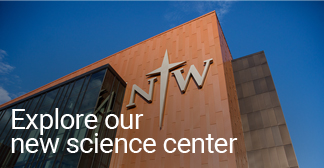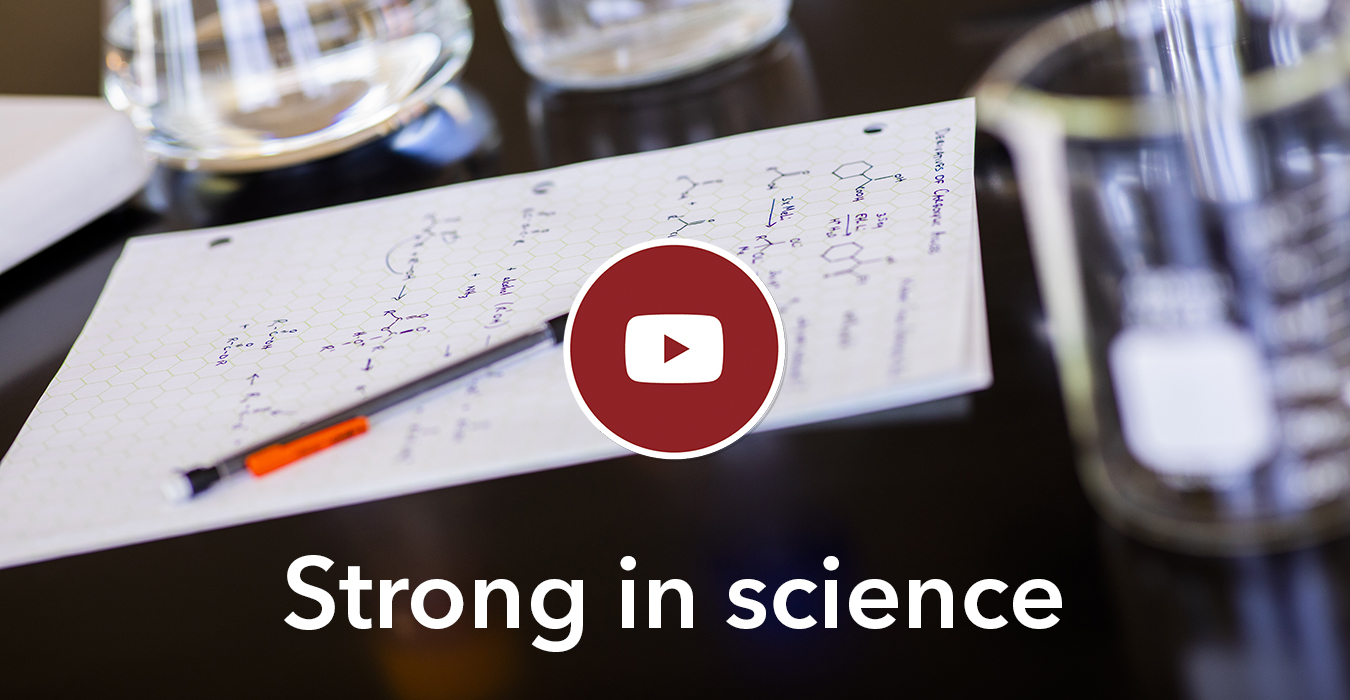Nobel Laureate Glenn Seaborg said, “Middle Ages man could not ignore the church, nor Renaissance man ignore the arts, nor could Eighteenth Century man ignore political thought. Likewise, modern man cannot ignore science.” Advances in chemistry have contributed to the extension of our knowledge of God’s creation — both his physical universe and we his people. A liberal arts major in chemistry will not only expand your mind, but also provide you with a broad spectrum of career opportunities. During the past decade, nearly one-half of Northwestern’s chemistry majors have attended graduate or professional schools in chemistry, biochemistry or medicine, while the remainder have pursued careers in business, industry or education. Chemistry has two principal goals: to determine and understand the properties of matter and its transformations (pure chemistry) and to develop processes to transform matter for useful purposes (applied chemistry). Northwestern’s chemistry curriculum will provide you with a rigorous and comprehensive understanding of the fundamentals of modern chemistry.
Major requirements
Chemistry elective 4
CHE 321 - Organic Chemistry
(4 credits) The study of carbon compounds and their functional groups, including nomenclature, synthesis, reactions, structures, mechanisms and spectroscopic analysis.
Prerequisites: CHE112 or permission of instructor.
Note: Three lectures and one three-hour laboratory period per week. A fee is associated with this course.
CHE 322 - Organic Chemistry
(4 credits) A continuation of the study of carbon compounds and their functional groups, including nomenclature, synthesis, reactions, structures, mechanisms and spectroscopic analysis.Prerequisite: CHE321.
CHE 433WIx - Introductory Physical Chemistry
(4 credits; alternate years, consult department) (Writing intensive) An introductory course in chemical
thermodynamics, quantum chemistry and chemical kinetics. Prerequisites: MAT112QR; and CHE112 or PHY212. Cross-referenced in physics.
Note: Three lectures and one three-hour laboratory period per week.
Choose one sequence: 8
CHE 101SN - College Chemistry
(4 credits) (NWCore option under Science and the Natural World) This course is an introduction to inorganic chemistry, with an emphasis on the health sciences. It is well suited for students whose programs require one year of chemistry.
Note: Three lectures and one 1.5 hour laboratory period per week. Open to all students. A fee is associated with this course.
CHE 102 - College Chemistry
(4 credits) An introductory course in organic and biological chemistry. The content is especially suited to meet the needs of students whose programs require only one year of chemistry. Prerequisite: CHE101SN.
Note: Three lectures and one 1.5 hour laboratory period per week. A fee is associated with this course.
or
CHE 111 - General Chemistry
(4 credits) An introductory course in chemistry that emphasizes physical and inorganic concepts, problems and calculations. Topics include chemical reactions, stoichiometry, properties of gases, thermochemistry, theories of atomic structure, and chemical bonding. The general chemistry sequence (Chemistry 111 and Chemistry 112) is recommended for students with good math / science preparations who intend to proceed to advanced courses in chemistry, the biological sciences or engineering. Prerequisites: high school chemistry and ACT math score of at least 22 (SAT 540 or above) or sophomore status.
Note: Three lectures and one three-hour laboratory period per week. A fee is associated with this course.
CHE 112 - General Chemistry
(4 credits) A continuation of Chemistry 111. Topics covered include kinetics, thermodynamics, chemical equilibria, acid-base chemistry and nuclear chemistry. Prerequisite: CHE111 or consent of the instructor.
Note: Three lectures and one three-hour laboratory period per week. A fee is associated with this course.
Choose one course: 4
CHE 211 – Quantitative Analysis
CHE 315 – Instrumental Analysis
Cognate requirements
MAT 112QR - Calculus I
(4 credits) (NWCore option under Quantitative Reasoning) This course is a study of functions, limits, derivatives and integrals with a strong emphasis on both theory and applications. Prerequisites: C- or higher in MAT109, or an ACT math score of at least 24 (SAT 570 or above), or permission of mathematics department chair.
Note: Meets four times per week.
Choose one course: 4
MAT 211 - Calculus II
(4 credits) A study of transcendental functions, techniques of integration, improper integration, sequences, series, polar coordinates and conic sections. Prerequisite: C- or better in MAT112QR or permission of instructor.
Note: Meets four times per week.
MAT 116QR – Statistics for the Natural and Social Sciences
Choose one sequence: 8
PHY 111SN – General Physics I
PHY 112 – General Physics II
or
PHY 211SN - Classical Physics I*
(4 credits) (NWCore option under Science and the Natural World) This is the first in a two-course calculus-based sequence. Topics include kinematics, Newtonian mechanics, energy, momentum, gravity, atomic physics, thermodynamics, and simple harmonic oscillations. Prerequisite: C- or higher in MAT112QR or consent of the department chair.
Note: There is a laboratory component to this course.
PHY 212 - Classical Physics II*
(4 credits) This is the second in a two-course calculus-based sequence. Topics include electricity, magnetism, electromagnetic waves, electromagnetism, and optics. Prerequisite: successful completion of PHY211SN with a grade of C- or better.
Note: There is a laboratory component to this course.
Total credits required: 44
For those students intending to pursue professional careers in chemistry, the following courses are strongly recommended:
CHE 315 - Instrumental Analysis
(4 credits; alternate years, consult department) A study of the theory and operation of common laboratory instruments. Topics include: infrared, visible and ultraviolet spectroscopy; atomic absorption and emission spectroscopy; nuclear magnetic resonance spectroscopy; mass spectrometry; gas and liquid chromatography; electrochemical methods. Prerequisite: CHE211 or permission of instructor.
Note: Three lectures and one three-hour laboratory period per week. A fee is associated with this course.
CHE 326x - Biochemistry: Proteins and Metabolism
(4 credits) A fundamental course surveying biomolecules, catabolism, bioenergetics and biosynthesis. Prerequisites: CHE321 and 322. Cross-Referenced: Cross-referenced in biology.
Note: Three lectures and one three-hour laboratory period per week. A fee is associated with this course.
CHE 436x - Intermediate Physical Chemistry
(4 credits; alternate years, consult department) An intermediate course in chemical thermodynamics, quantum chemistry, and chemical kinetics. Prerequisite: CHE433WIx. Cross-Referenced: Cross-referenced in physics.
Note: Three lectures and one three-hour laboratory period per week. A fee is associated with this course.
CSC 151 - Office Application Programming
(2 credits; alternate years) This course focuses on the customization and programmability of commonly used business applications. The main topics covered will include writing macros, controlling spreadsheets, databases and other business applications using scripts and short programs, and customizing applications to fit specific business needs. Prerequisite: CSC102 or permission of instructor.
CSC 171QR - Computer Science I
(4 credits) (NWCore option under Quantitative Reasoning) This is the first in a two-semester sequence of courses that introduces students to fundamental aspects of the field of computing; focusing on problem-solving, software design concepts and their realization as computer programs. Topics include procedural abstraction, control structures, iteration, data types and their representation. An introduction to a high-level language, for the purpose of gaining mastery of these principles, will be provided in lectures and hands-on laboratory experiences. Prerequisite: ACT math score of 20 or above (SAT 510 or above).
PHY 211SN – Classical Physics I
PHY212 – Classical Physics II
MAT 211 – Calculus II
MAT 212 - Calculus III
(4 credits) A study of the cylindrical and spherical coordinate systems, vectors in two dimensions and three dimensions, vector valued functions, functions of several variables, multiple integration, and vector calculus. Prerequisite: C- or better in MAT211 or permission of instructor.
Note: Meets four days per week.
MAT 312 - Differential Equations
(3 credits) A study of the elementary theory, methods of solution, and applications of differential equations, which may include topics such as first order ordinary differential equations, linear equations with constant coefficients, series solutions, variation of parameters, Laplace Transforms, linear systems, partial differential equations, and Fourier Series. Prerequisite: C- or better in MAT211 or permission of department chair.


